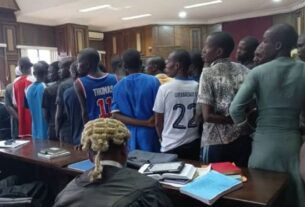The national welfare officer of the African Democratic Congress (ADC), Nkemakolam Ukandu, a defendant in a case on the party’s national leadership, has sought the reassigning of the suit to another judge.
Ukandu asked the Chief Judge of Federal High Court, Abuja Division, to reassign suit No. FHC/ABJ/CS/1331/2025, filed by Dubem Kachukwu & 4 Ords v. the Independent National Electoral Commission (INEC) and 5 Ords, to another court.
Ukandu, the 6th defendant in the case, currently before Justice James Omotosho of FHC No. 7, said he is not likely to get fair hearing.
The defendant stated this in a motion on notice brought under Order 49 Rule 1 of the Federal High Court (Civil Procedure) Rule 2019, filed by his lawyer, Kalu Kalu Agwu.
He alternatively sought an order staying further proceeding in the suit pending the chief judge’s decision on his application.
Ukandu, in his motion, dated October 31, said the ground for his application arose from “manifest bias or grave likelihood of bias leading to breach of fair hearing” before Justice Omotosho.
The party’s welfare officer said he was joined in the suit on October 3, and that the court direct the plaintiffs’ counsel to make a consequential amendment on the originating process.
He said the amendment was to reflect the joining of the 6th defendant on the matter, and serve all parties, before the case was adjourned to October 23 for hearing.
Ukandu however said the plaintiffs’ counsel was unable to serve him the amended originating process until October 22, a day before the adjourned date, which he, the counsel informed the court.
The defendant/applicant said his counsel told the judge that he would be bound by the Rule of the court to file his reply, which is 30 days.
He however, said he was taken aback when the presiding judge, “without any application for abridgement of time by any counsel in the matter, suo moto, abridged the time within which the 6th defendant counsel should file his defense to the plaintiffs’ originating process.”
The defendant said instead of 30 days allowed by the Rules of the court, he was given only seven days to respond.
He said the seven days included Saturday and Sunday, which he said made it impossible for his counsel to respond appropriately.
Noting that the suit is not time-bound as to demand such urgency, he said his right to fair hearing has been denied by the abridge of time, and has been denied the opportunity to file defense.














